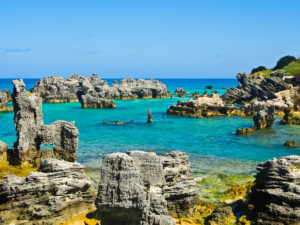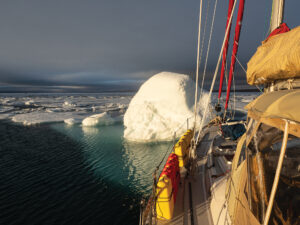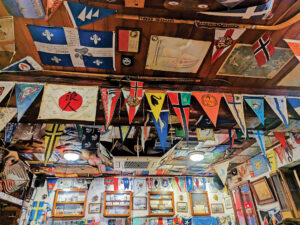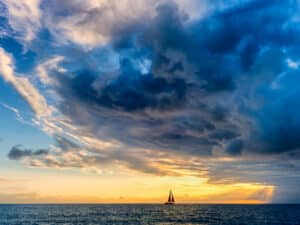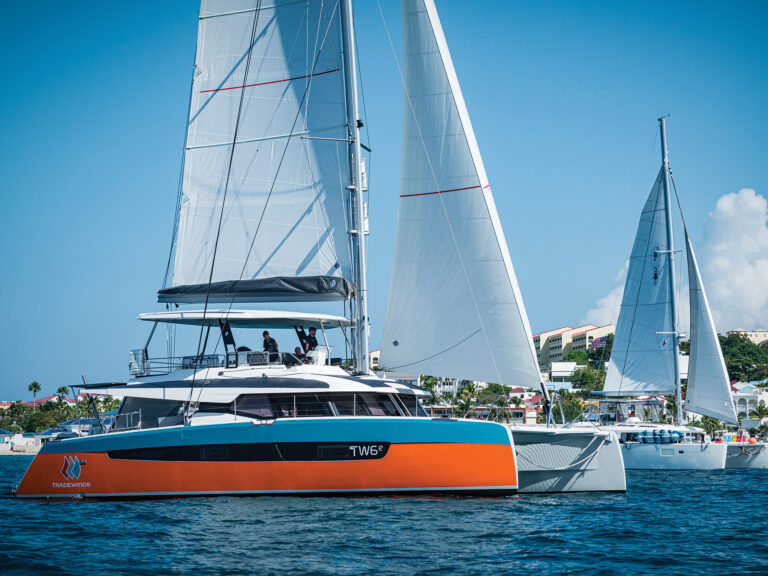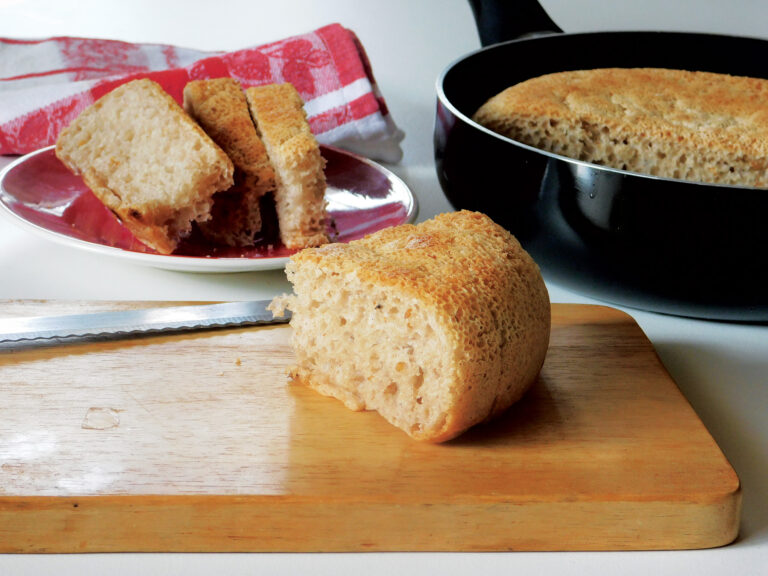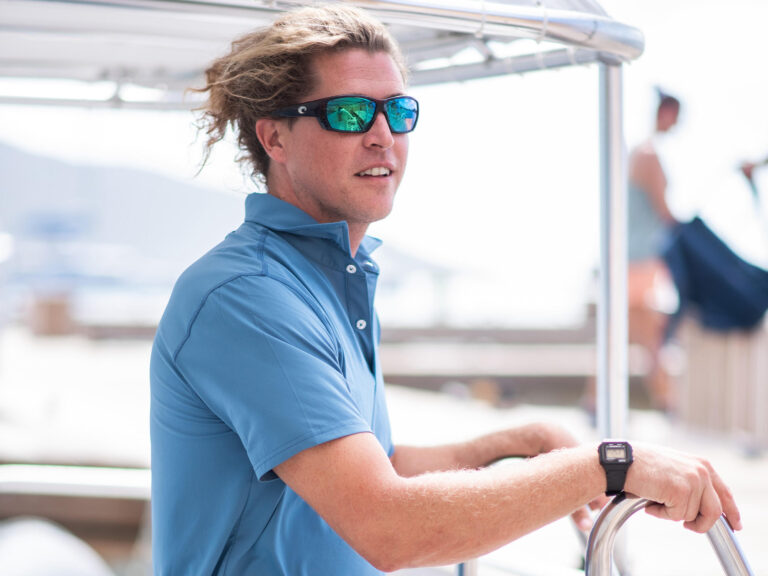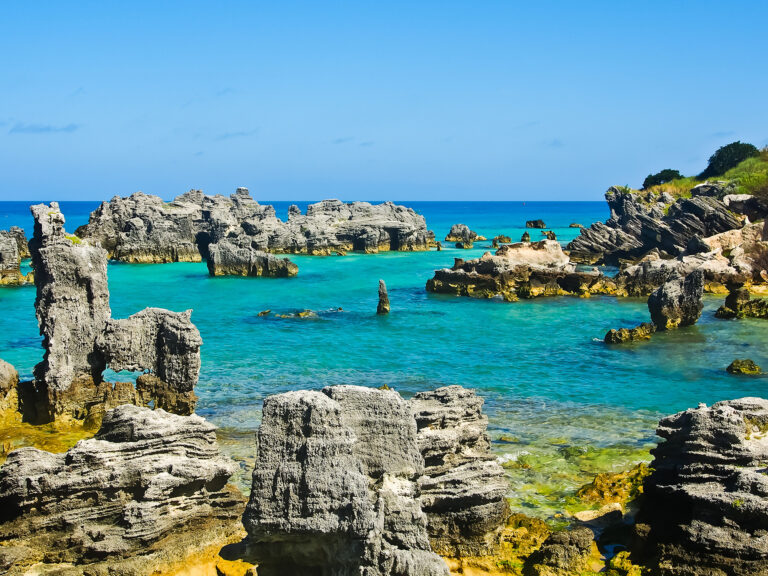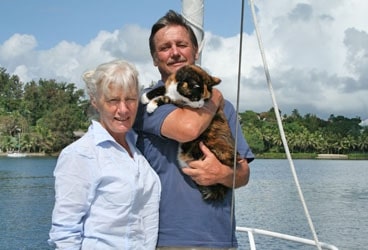
Alvah Simon and Family 368
Information and technology has changed the face of cruising in many positive ways. For all my nostalgia about snapping a fleeting sun shot with my trusty sextant after four days without a fix, I am not about to give up my GPS. The Roger Henry now bristles with antennae, radar domes, and solar panels to power it all. The very fact that I am able to post this report from around the world testifies to my conversion.
The foundation of sound seamanship is forehandedness, so why would anyone not employ ALL the tools and sources of information available to them?
Well, because it detunes our own powers of observation, erodes crisp decision making, and ultimately abdicates responsibility to the forecast gurus who push us out of weather “windows” and cruising guidebooks that hold our hands through what were once exploratory experiences. I am beginning to wonder if we haven’t crossed a line- stripped some of the challenge and therefore visceral joy out of ocean passage, landfalls, and gunk-holing new nations.
The go-to source “The Tuskers Guide To Vanuatu” is free, informative, and accurate. And in fairness it pays a lot more respect to the local people, language, and customs than, for example, the Tongan guidebooks that do not bother with those pesky native names for islands and anchorages, they simply number them. “See you at 19.”
But, the operative word is guide. There are other anchorages outside the “known world”, in those blank spots on the charts that warn, “beyond here there be beasts”. These opportunities are finessed from meticulous observation of the chart, intuitive reading of the lay of the land, and careful probing into uncharted waters. A little more risk for a little more reward. For me, the thrill of finding a lonely gem of an anchorage always was, and I hope still is, part of the cruising experience.
On an ancient chart I saw an intriguing little hook in the land at the west end of Ambrym Island. It appeared that a narrow channel led into an enclosed lagoon at the very base of the mighty Benbow volcano. No guidebook mentioned it, nor modern chart showed it.
Diana pulled out The Pacific Islands Pilot Vol. II -1967 Edition. She asked if perhaps we shouldn’t update it. I said, “Why? The rocks don’t move.” Wrong again. Seems to be in season for me. In fact the rocks did move, a lot.
In the Old English of the Pilot, colored with such phrasing as “keep a good head of steam for a timely escape”, Diana read aloud how a cataclysmic eruption poured millions of tons of molten lava and ash down into my mystery lagoon, and sealed the entrance off from the sea.
I was disappointed yet still excited by our little exercise. I hope from here on north it will spark us into going that extra mile to make this as rich an experience as possible.
We are now anchored in Awai lagoon in southern Malakula. The odd canoe sails by, but they do not see the volume of yachting traffic that our last stop in Lamen Bay on Epi Island did.
The people here are shy. They may hover off the boat, but dare not barge right up and ask if you want to buy a tomato or a bunch of bush cabbage. Their dark faces explode in smile when you wave them over.
As they paddle up the wife whispers instructions to her husband about how to best conduct their business. He needs to get it right, because other than their lush land, they have almost nothing. Often their clothes are literally falling off of them. A family might own a couple cheap pots, a machete, and if lucky or careful still have a few fish-hooks and line left.
They are always shocked and delighted when I invite them up for a cup of coffee for the adults and a piece of candy for the stunningly beautiful little children. This simple gesture of respect breaks down the barriers of color, class, and national origin.
The yachts that keep them at a paddles distance remind me of a Hyatt Hotels in Lebanon- an oasis of inexperience, an insulation from the harsh realities outside that door. But that’s “side blong himpella” (their choice).
Halifax is a very big cat, and she gives them a real fright when she thunders up the companionway steps to check them out. A 240-pound man asked me if it was safe to step past her down the steps.
They are mystified by the boat’s interior. The galley foot pump is a big hit; the kids can stand there and pump a barrel through without losing interest.
Rather than trading goods we have taken to paying for our vegetables and then giving them a small gift- a hat or shirt, some hooks, or sewing needles. For all the food their gardens provide, they can always use a little cash.
We ask permission to fish, dive, hike, or do anything, for not a rock, river, or reef goes un-owned. We have not yet been denied.
I am finding the entire experience heartwarming and humbling. It’s hard to cry poor when you see what poor really is. The people of Vanuatu live on so very little, yet still they smile, those big, bright, sunshine smiles.
Awai Bay, Malekula Island, Vanuatu
Alvah Simon

